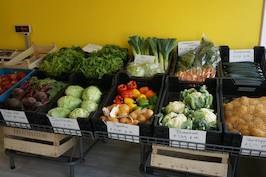 |
|
Fruitcafé de Helpende Hand: initiatives from local residents
Fruitcafé de Helpende Hand (the Helping Hand) started up as neighborhood social enterprise selling affordable fruit and vegetables. After a few years they changed their business model. It is now transformed into the “living room” of the neighbourhood. New initiatives really come from the local residents, thus supported by the neighbourhood. Effective, sustainable and future proof!
|
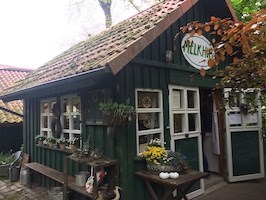 |
|
Melkhus – a touristic initiativeRural regions are strongly influenced by agriculture since the meadows, pastures and fields are formed and shaped through the daily work of the farmers. But the relationship with the products resulting from farming is increasingly disappearing. The farms are considered part of a bigger picture, lacking the individual stories behind the farms. As a result society is disconnected with agricultural production. Therefore in Northern Germany the 'Melkhus' was introduced. More information and detailed description
|
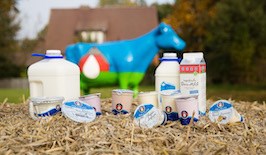 |
|
Milchhof Diers – direct marketing and delivery of milk product
The company Milchhof Diers decided 60 years ago to process a proportion of their milk in their own dairy, with the goal of becoming more independent of the big dairies. Hereby, the family Diers took the first step towards becoming independent also from the development in the global market and to seize opportunity to grow in a product segment with low margins.
|
 |
|
Friday Local Food Market at supermarket Citygross
The retail store Citygross in Kungälv, West Sweden, have for several years provided their customers with a wide range of regionally produced food. The share of regional products in the assortment today is about five percent.
Active co-operation with Locally Produced in West (Lokalproducerat i Väst) - a resource centre for small-scale food producers in Region Västra Götaland, Sweden, has been a success.
More information and detailed description
|
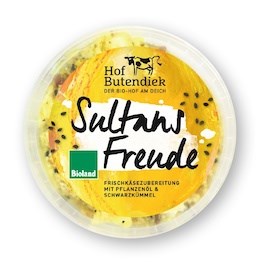 |
|
Increasing added value with cheese production and direct marketing
As a family-owned farm, it is crucial to change and grow constantly in order to stay competitive. Hof Butendiek, located in Seefeld (Northern Germany) decided to change their milk production from conventional farming to organic farming, with the intention to add more value to their milk production and their products, but also to consider the growing interest of consumers in organic produced food.
More information and detailed description
|
 |
|
Programme to help SMEs strengthen their market communication
In order to help food related SMEs in West Sweden to strengthen their market communication and increase the visibility and attractiveness of their products on the shelf in the grocery stores, a special program was implemented. In this way the SMEs were more capable to meet the demand from the big regional grocery stores.
More information and detailed description
|
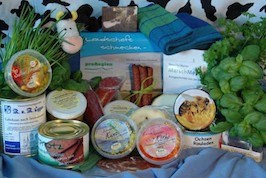 |
|
The Wesermarsch specialties box “Schlemmerkiste”
Small and medium scale food producers need to make efforts to make their products visible and attractive for consumers. One way for small regional producers is to bundle products from different producers and offer them as a package to the consumer. In the region of Wesermarch this strategy was tested with so-called “Schlemmerkisten”.
More information and detailed description
|
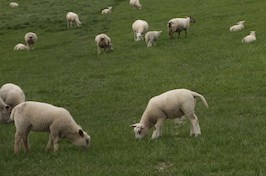 |
|
Taste of Heimat - Ox and lamb weeks in the Wesermarsch
In order to give regional and seasonal products a higher level of attention and importance, lamb and ox weeks were set up in the region of Wesermarsch (Germany) by committed farmers, butchers, restaurateurs and other processors.
More information and detailed description |
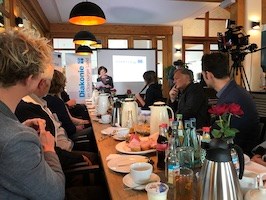 |
|
Café Mitmensch
At the end of 2018, Café Mitmensch was started. A café that works with social integration of the disabled, and mainly uses products from the region. The goal is shorter food chains and a development of the region’s business sector. But also to raise awareness of sustainable development and healthy products among their customers.
More information and detailed description
|
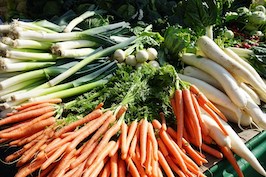 |
|
CSA - an alternative marketing system
CSA stands for Community Supported Agriculture, which constitutes a win-win situation for farmers and consumers.
At the beginning of the year, the consumer pays a fixed fee, a kind of share in the farm. He does not only gets fresh products, but also gets involved in everything that´s happening on the farm.
More information and detailed description
|
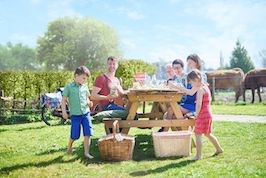 |
|
A taste of farm life in a picnic basket
In the Belgian province of West Flanders, 22 farms offer visitors well-filled picnic baskets. The farm picnic offers holiday-makers a chance to vicariously enjoy the country life of today´s farmers.
More information and detailed description
|
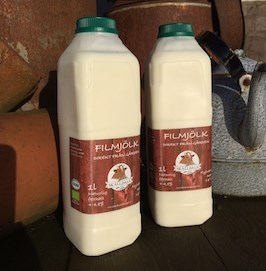 |
|
Skålldals Lilla Ekomejeri – the advantages of diversifying your business
In recent years, there has been considerable variation in the price of milk for Sweden's dairy farmers. Many dairy farmers have chosen to shut down their farms and milk production. Some of them, on the contrary, have invested in building up a completely new business case and increased their profitability. By refining parts of their milk and setting up a new business model they have found a successful way forward. A good example is Skålldals Lilla Ekomejeri. By diversifying their business, they have reduced their vulnerability and increased their profitability.
More information and detailed description
|
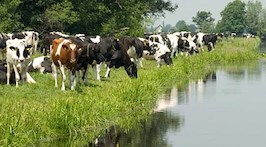 |
|
Regional beef cooperative
The regional beef cooperative Natuurvlees Westerkwartier is a joint venture between various links in the meat chain: a.o. dairy farmers, cattle farmers, nature conservation organizations, meat processors and care institutions.
More information and detailed description
|
|
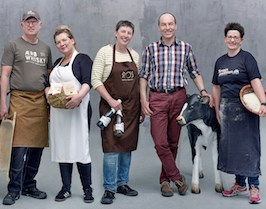
|
|
COOP Crowdfunding
COOP Crowdfunding is a pilot project consisting of a platform to raise funding for visionary food producers who have a good idea, but lack funding to realise their ideas. With this platform the general public will be able to benefit from the cooperation by getting even better food products.
More information and detailed description
|
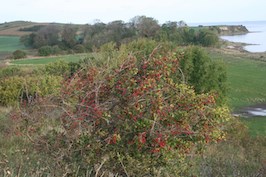 |
|
Ø-specialiteter® (Island Specialities) – a terroir in Danish
EU approved regional brand protections have never been widely used in Danish food production. The terroir concept Ø-Specialiteter® (Island Specialties) promotes a re-discovery of the diversity of natural conditions where adaptive food production can accommodate these differences and thus potentially promote greater sustainability in production. More information and detailed description
|
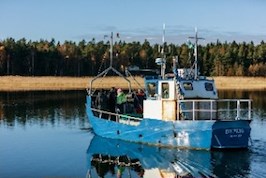 |
|
Building a brand for locally produced food
Fishermen at Spiken by lake Vänern made an important decision building a business compound where seventeen small-scale fishing companies cooperated building a stronger brand for regional whitefish roe. More information and detailed description
|
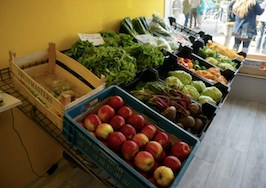 |
|
Fruitcafé de Helpende Hand as a neighborhood social enterprise
Fruitcafé de Helpende Hand is primarily a neighborhood social enterprise. Themes that take shape within the store are healthy food, social activation and meeting each other, healthy ageing and sustainability.
The store is a social enterprise (cooperative) with a matching business model.
More information and detailed description
|
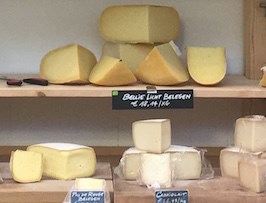 |
|
Lousbergmarkt in Ghent
Lousbergmarkt is a covered market that first opened its doors in September 2016, within the city center of Ghent. Four local businesses joined forces to create high-quality traditional craftsmanship with local products and the new Lousbergmarkt was born, an idea that comes from the South.
More information and detailed description
www.lousbergmarkt.be
|
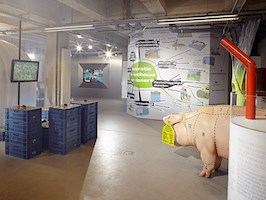 |
|
House of Food | Factory for the future
The food industry is an important economic activity of West-Flanders. 925 food processing enterprises are situated in West-Flanders, of which 90 percent SME’s. Although the food industry offers 16.000 job opportunities in West-Flanders, it is facing a number of challenges.
Innovation measures are therefore more important than ever.
More information and detailed description
|
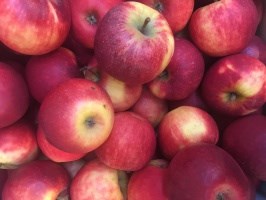 |
|
De Streekboer (The Regional Farmer)
A business model for an intermediary between regional food related SMEs and urban consumers.
With De Streekboer customers can order online fresh products from regional farmers and producers.
Every Thursday the delivery takes place at a fixed location.
More information and detailed description
www.destreekboer.nl/groningen
|
 |
|
Pilot “proeftuin Zwart Mosterdzaad”, experimenting with growing black Musterdseed
The Municipality of Groningen helped to develop a model for the regional sourcing of black mustard seed for the production of a regional mustard brand.
More information and detailed description
|
 |
|
Toentje - Producing food for the Food Bank
Toentje produces free fresh local food for the Food Bank. A large number of the Toentje volunteers are long term unemployed, who through Toentje gain skills and structure that make them more employable.
More information and detailed description
|






















